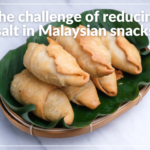Meat analogues, also known as meat substitutes or mock meat, is not new to Asia. The introduction of meat analogues emerged in the 6th century AD, influenced by the restricted diets of Chinese Buddhism. Traditionally, wheat-gluten or soy-based products were common ingredients found in meat analogues. One example is tempeh in Indonesia, a traditional fermented soy-based food originating from Java. Another example is soy milk in Japan, a conventional ingredient used to make yuba (curdled soymilk) which is usually eaten alone or thinly sliced and prepared with vegetables. These products have been used throughout Asia in areas where poverty restricted access to meat as well as religious dietary restrictions. As such, plant-based foods were more affordable, functional, and nutritious protein sources for this population1.
The current potential of this market
Over the years, plant-based meats have become more meat-like in appearance and texture. Soy-based meat analogues have the largest market share in Asia. Meanwhile, other newer proteins like pea, mycoproteins, and lab-grown cultured meat are also showing growth in this region. To appeal to mainstream meat-eaters, plant-based meat products were developed to mimic favorite foods in familiar formats like burger patties and sausages2.
Today, consumers eating habits are influenced by increasing concern for health, environment and ethical topics. As a result, many consumers are responsibly reducing their consumption of animal products. According to Euromonitor, there are a total of 4.98 million vegetarian in APAC. Indeed, India has the largest vegetarian population in this region3: 3.68 million.
Here is how the market is made up
Back in 2010, 53% of meat substitute launches in APAC came with vegetarian claims, targeting a very niche group of consumers. Vegetarian diet is defined by no consumption of meat. The food make up consists of vegetables, grains, and sometimes eggs and dairy products. Traditional mock meats have faced image issues due to their highly processed nature and low nutritional value. However, mock meat launches have moved towards the GMO free and vegan/ animal free direction over the last five years. Starting in 2015, Asia Pacific became a rising market for “flexitarian” dieters, who occasionally substitute meat in their diet with plant-based protein. This interest in plant-based foods offers lucrative growth opportunities in this segment4.
The growth of plant-based diets is influenced by multiple factors
According to a study from Euromonitor, the market value for meat and seafood substitute in Australasia in 2022 was USD 140.7 million, with a projected CAGR of 11.3% based on market value from 2023 to 20275. The growth of plant-based diets is influenced by multiple factors such as:
- Health & Wellness: as mentioned in our recent campaign, in Asia Pacific, the demand for healthy food is fast rising. Consumers seek natural, functional and nutritious diet in healthy eating. 22% of consumers try to limit or reduce products/ingredients that are bad for them.6
- Ethics & Environment: Post covid-19 surveys show that 49% of Koreans agree that plant-based foods are better for the environment than meat and dairy products. A Mintel survey based on the frequency of food behaviors with 1000 respondents revealed that 33% of Indians limit their meat intake all the time7. And overall, 24% of Asia Pacific consumers are limiting their meat consumption for environmental convictions.⁸
- Safe & Clean: Consumers now demand a comprehensive understanding of what goes into their food. The once-basic expectation of ingredient safety has evolved into an insistence on brands divulging intricate details of ingredient origins, processing methods, and supply chain practices.
Developing products to address these topics is causing the plant protein space to grow. Biospringer has the technical capability to bring solutions to the market. Our team in Asia Pacific, based in Singapore, has been developing a dedicated yeast extract portfolio with new applications such as plant-based chicken nuggets and vegan mayonnaise, in order to meet consumers expectations.
You wish to learn more about those formulations?
Watch our experts webinar!
- Euromonitor International, Plant-based Meat Substitutes: Opportunities and Challenges in Southeast Asia, 2020
- Ismail, I., Hwang, Y. H., & Joo, S. T. (2020). Meat analog as future food: a review. Journal of animal science and technology, 62(2), 111–120. https://doi.org/10.5187/jast.2020.62.2.111
- Euromonitor International, Vegetarian Population: Euromonitor International from European Vegetarian and Animal News Alliance (EVANA), European Vegetarian Union, national sources, 2020
- Mintel, The future of meat in Asia: animal, plant-based or cell-based?, 2020
- Euromonitor, 2022
- Innova Database, 2022
- Mintel Interactive Databooks, Food Tracker: Frequency of Food Behaviours, 2020
- Innova, 2023









